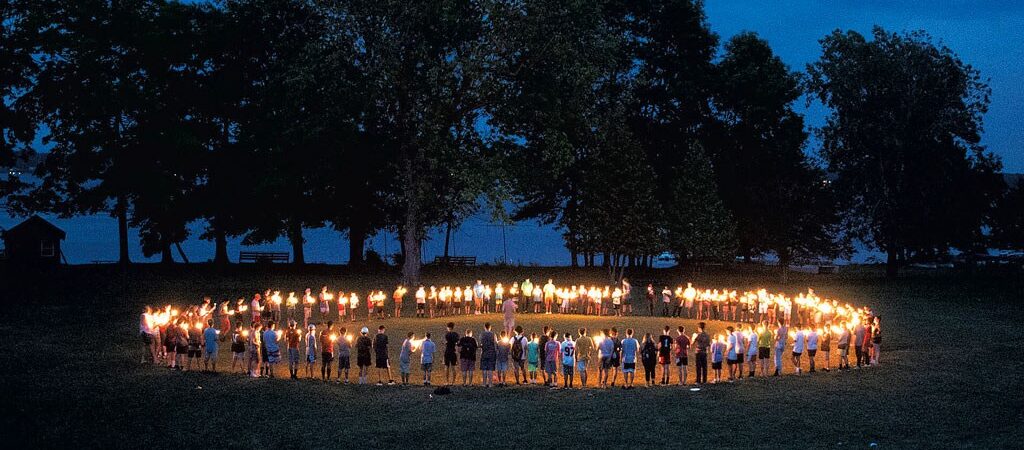Is My Child Ready for Sleepaway Camp? Am I?
It’s natural to be a little unsure about sending your child to sleepaway camp for the first time. Lauren Frazier, overnight camp enrollment coordinator for YMCA Camp Mi-Te-Na and Camp Foss in New Hampshire, is sending her 7-year-old daughter to Camp Foss for the first time this summer. “I’m even getting a little nervous,” she admitted.
It’s possible those normal jitters are a bit more intense post-pandemic. Parents spent so much time at home with their kids that it might be a little harder to let them leave.
But sleepaway camp can be a magical and transformative experience for kids, and Frazier and other camp directors point out that there are lots of things parents and camp staff can do — before and during the session— to set campers up for success.
Is it time to stay overnight?
There’s no right age to start sending kids to sleepaway camp.
Frazier said there are a handful of 7-year-olds at Camp Foss, though generally the age range is 8 to 15. The camp’s sweet spot tends to be age 10. She went to overnight camp in New Jersey, where she grew up. “I started at age 12, and I wish I had started earlier,” she said.
Brian Roy of YMCA Camp Abnaki and Christine Perry of YWCA Camp Hochelaga said they often see first-time campers in the 10 to 12 age range.
My kids were both happy campers; this summer they’re returning as a counselor and a counselor-in-training. They both eased into the overnight experience by starting with daytime sessions at their camps, but Graham started staying overnight at Camp Abnaki at age 9 and Ivy started over at Camp Hochelaga at age 8. Every kid is different.
How will you know when your child is ready? Roy asks some key questions: How do they handle sleepovers with friends or family when you’re not there? When you drop them off, do they jump right in or do they need some coaxing?
Most importantly: Do they want to go to sleepaway camp? If they don’t express interest, it’s probably not time yet.
Choose a camp
Picking a sleepaway camp is a big decision. If your child likes it there, they might want to keep going year after year. It can become a big part of their life.
As someone who never got attached to a camp, I didn’t fully appreciate how devoted my kids would be to theirs — and to the friends they made there. All the more reason to do your research before sending them. Talk to the camp director. Talk to other parents. Get a sense of how they hire staff and how many counselors return year after year. Pay attention to the camp’s values and mission.
One of many things we loved about Camp Abnaki, for example, was its motto — “Help the other fellow” — and the way the director and staff modeled it.
Get ready to go
Many camps offer virtual and in-person tours of the campus before the session starts. If you or your camper is a little nervous, taking a tour might make the adjustment easier.
Talking with the camp director and other staff can help, too — particularly if your child takes medications or has allergies or other health challenges. Some camps are set up to cater specifically to children with serious illnesses or chronic conditions, such as Double H Ranch in Lake Luzerne, N.Y. “Double H’s expert staff and medical team are here to help care for you and your child throughout the entire camp process, from submitting an application to departure day,” creative engagement director Julia Martini said.
Perry noted that this year, all Hochelaga staff will receive training on mental health issues and best practices for dealing with them.
At Camp Mi-Te-Na and Camp Foss, every camper gets a phone call from camp staff within a month of registering. “We make ourselves available to everyone who has questions,” Frazier said.
Brian DeGroat of Pok-O-MacCready Camps advises parents to ask questions — and include their kids in the process.
Roy, at Camp Abnaki, suggests that first-time campers or those who are nervous pack something that they can look forward to using at camp, such as a Rubik’s cube or a new book in a favorite series, that will also serve as a distraction during quiet times.
If your child needs white noise or air blowing on them to fall asleep, consider packing a battery-powered fan. Also, kids should be prepared to surrender their screens: Most camps don’t allow devices such as tablets or smartphones.
Engage appropriately during the session
Saying goodbye and leaving your child at camp can be rough for parents and campers alike. Ken Picard, Seven Days staff writer — and father of two campers — has some advice: “Be like a Band-Aid and take off quickly! While many parents like to make sure their child gets settled into their bunk, especially for their first camp stay, it’s best that parents say their goodbyes and begone.”
Frazier agrees that for campers, “the first day is the hardest.” They often haven’t bonded with their cabinmates yet and haven’t settled into camp life. She warns parents that letters from the first day can have a negative tone.
Camp staffers will generally counsel parents: Resist the urge to intervene. Counselors are trained to handle homesickness. Frazier said that, in most cases, camp staff will not allow campers to call home, because it makes homesickness worse. Though “if we have gone through all the steps of our process, we have used it as a last resort,” she said. “Of course, if the parents need to speak with their camper because of a family emergency or along those lines, we have been able to arrange that.”
Some camp staff will check in proactively with new families. At Camp Abnaki, all first-time families get a phone call or email from a counselor in the first three days to give an update on how the camper is doing.
It can help to see photographic evidence that your child is, in fact, participating in camp life. Many programs take photos and post them to a special website or social media group that you’ll learn about at drop-off.
At Camp Foss, Frazier said a staffer takes between 300 and 1,100 photos a day and uploads them to a service the camp uses to control access to them. That service also uses facial recognition to alert parents to new photos of their child.
Campers will also appreciate care packages, though camps often have restrictions around sending food. We used to send comic books or MAD magazines, or items the kids might have lost, such as a water bottle or flashlight. What they loved most were the LEGO-shaped fruit gummies my wife made; she always sent enough for the kids’ cabinmates, too.
Manage your sticker shock
If you’re looking into sleepaway camp for the first time, don’t dismiss it when you see the price tag. It’s true: Overnight camp can cost thousands of dollars. All that round-the-clock care isn’t cheap.
But there are things you can do to defray the costs . You can budget for it, too; my wife created a camp account and put part of every paycheck toward it all year long.
Also remember that there are people out there who are passionate about summer camp and will donate to help other children access the experience. When one of Graham’s friends was interested in attending Abnaki but couldn’t afford to pay, the camp director worked with us to find funding for him. He went for years and loved it.
Picking the two of them up at the end of the session — and hearing them bid farewell to their counselors and new friends — always made the experience seem worth it.




